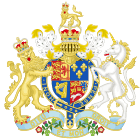Papists Act 1738 facts for kids
| Act of Parliament | |

|
|
| Long title | An Act for allowing further time for Inrolment of Deeds and Wills made by Papists, and for Relief of Protestant Purchasers, Devisees and Lessees. |
|---|---|
| Citation | 12 Geo. 2. c. 14 |
The Papists Act 1738 was a law passed in Great Britain in 1738. It was created by the Parliament of Great Britain during the time of King George II. This act dealt with legal documents and property for people known as "Papists," which was a term used for Catholics at the time.
Contents
What Was the Papists Act 1738?
The Papists Act 1738 was a special law. Its main goal was to give more time for Catholics to officially register their legal papers. These papers included deeds (documents about property) and wills (documents about what happens to your belongings after you die). It also aimed to help Protestants who bought land from Catholics.
Why Were These Laws Needed?
In the 18th century, Catholics in Great Britain faced many laws that limited their rights. These laws were often called "Penal Laws." They were put in place to reduce the influence of the Catholic Church. These laws affected many parts of life, including owning land, working in certain jobs, and even practicing their religion freely.
One big problem for Catholics was how they could own or pass on property. Many laws made it hard for them to register their land deeds or wills correctly. This could cause confusion and legal problems later on.
What Did This Act Do?
The Papists Act 1738 tried to fix some of these problems. It was a small step towards making things a bit easier for Catholics in certain legal situations.
Helping Catholics with Documents
The act gave Catholics more time to register their deeds and wills. If these documents were not registered properly, they might not be legally valid. This act helped prevent Catholics from losing their property due to old, strict rules about registration deadlines. It meant they had a longer chance to make sure their property documents were official.
Protecting Protestant Buyers
The law also protected Protestants who bought land from Catholics. Because of the complex laws, sometimes it was unclear if a Catholic truly owned the land they were selling. This act helped make sure that if a Protestant bought land from a Catholic, their purchase would be safe and legal. It reduced the risk for Protestant buyers.
Life for Catholics in 18th Century Britain
During the 1700s, being Catholic in Britain was challenging. They were often seen with suspicion by the government. Many laws restricted their ability to participate fully in society.
For example, Catholics could not hold public office. They could not vote in elections. They also faced difficulties in education and owning property. The Papists Act 1738 was one of many laws that tried to manage these issues. It showed a small move towards addressing some of the legal difficulties faced by Catholics regarding their property.

